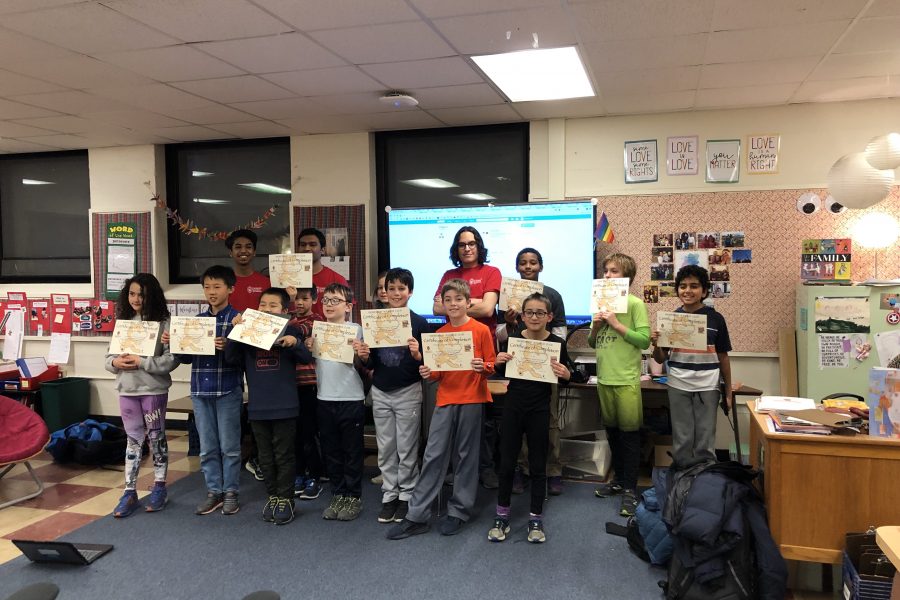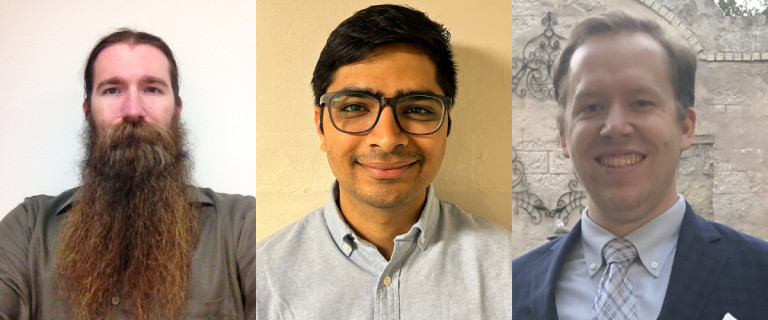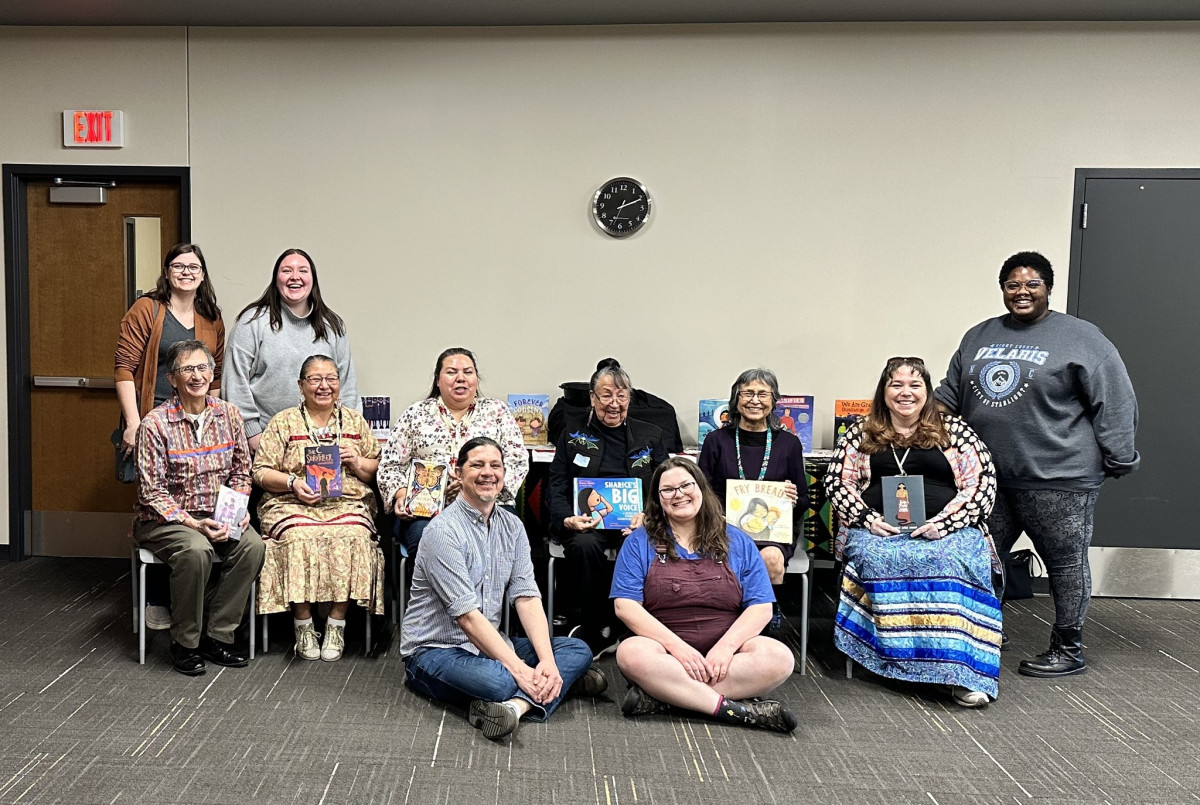 The Madison skyline and the length of State Street is seen from a drone on a colorful fall (autumn) morning at the University of Wisconsin–Madison. Photo: Althea Dotzour / UW–Madison
The Madison skyline and the length of State Street is seen from a drone on a colorful fall (autumn) morning at the University of Wisconsin–Madison. Photo: Althea Dotzour / UW–Madison
At the University of Wisconsin–Madison, the School of Computer, Data & Information Sciences (CDIS) is doing more than advancing research and education in computing, data, and information — it’s forging powerful partnerships that are transforming how work is done across campus and throughout Wisconsin. From building bridges with elementary schools and Tribal Nations to enabling campus-wide scientific breakthroughs through statistical and computing expertise, CDIS is demonstrating the power of collaboration in action. These partnerships are examples of how CDIS connects people and disciplines to fulfill the Wisconsin Idea and shape the future of the university. Read more about several of them below.
CaTaPuLT: Computational education for local elementary schoolers
To address a critical gap in early computer science education, the CaTaPuLT (Computational Thinking, Programming, Logic, and Technology) program was established for elementary-school children.
Launched by Computer Sciences professor Andrea Arpaci-Dusseau, CaTaPuLT engages 4th and 5th graders through after-school clubs led by university students. Thoreau Elementary School in Madison hosts one such program, where the coding clubs are “incredibly popular,” according to a statement from the school. “We have to hold a lottery each semester because we regularly receive over 25% more student registrations than spaces available. We appreciate UW’s commitment to the program and the talented UW students placed at Thoreau each semester,” the school said.
 A group of elementary school students are joined by UW–Madison student instructors in a Scratch Club at Shorewood Hills Elementary School. The clubs focus on teaching kids basic Computer Sciences concepts and how to create projects in Scratch, a highly visual programming environment specifically designed for novice programmers. Photo courtesy of School of Computer, Data & Information Sciences (CDIS)
A group of elementary school students are joined by UW–Madison student instructors in a Scratch Club at Shorewood Hills Elementary School. The clubs focus on teaching kids basic Computer Sciences concepts and how to create projects in Scratch, a highly visual programming environment specifically designed for novice programmers. Photo courtesy of School of Computer, Data & Information Sciences (CDIS)
As part of the program, Arpaci-Dusseau also started COMP SCI 402, which trains UW–Madison students to become instructors. The CaTaPuLT clubs focus on creative aspects of computation, encouraging kids to develop original games, stories, and interactive art using the Scratch programming environment, proving that computational thinking is a fundamental skill for everyone, not just computer scientists.
Students who have taken COMP SCI 402 (Introducing Computer Science to K-12 Students) have found the experience of teaching younger students key CS concepts and basic programming skills fulfilling. “The class has made me discover a love for teaching that I thought I never had,” one UW–Madison student said. “Giving the kids an opportunity to learn more about how computers work gives them a chance to develop these skills ahead of their peers and get them into a topic they may never have known existed before,” another added.
Statistical Consulting: Empowering researchers with data expertise
The widespread availability of useful data means that statisticians and data scientists are in high demand across university campuses. Researchers need help making sense of their data through advanced statistical techniques, tailored to their specific datasets. The Department of Statistics has long taken pride in bringing statistical expertise to UW–Madison researchers across a range of fields, including business, biology, medicine, communications, and more. The Statistical Consulting Group housed in the department exemplifies this approach.
“Our group supports any researcher on campus, from drafting grant proposals to analyzing data to navigating reviewer feedback,” said Nicholas Keuler, Statistics teaching faculty and manager of the Consulting Group. Directed by professor Cécile Ané, the group also includes Statistics PhD students and enables them to gain statistical consulting experience in research settings while providing valuable support to campus collaborators.
 Statistical Consulting Group members from left to right: Group Manager Nicholas Keuler, PhD candidate Ajinkya Kokandakar, and PhD student Steven Moen.
Statistical Consulting Group members from left to right: Group Manager Nicholas Keuler, PhD candidate Ajinkya Kokandakar, and PhD student Steven Moen.
“It’s tremendously rewarding to know our work is necessary and to make something tangibly, clearly better,” Steven Moen, a Statistics PhD Student and Statistical Consulting Group member, said. Last year, the group met with over 200 clients from across campus, the majority of which reside in the College of Agricultural and Life Sciences—including Bacteriology, Genetics, Food Science, and Life Sciences Communication.
TLAM: Connecting the university with Wisconsin’s Tribal Nations
Tribal Nations in Wisconsin have unique cultural heritages, and they require libraries and archives to effectively preserve their cultures for generations to come. However, Tribal libraries have historically been under-resourced, and some have faced difficulties maintaining consistent services. Founded in 2008, Tribal Libraries, Archives & Museums (TLAM) is a unique partnership between the iSchool and Wisconsin’s Tribal Nations, bringing together Library & Information Studies students and local tribal communities to address the underrepresentation and unique challenges faced by tribal cultural institutions through building lasting relationships, deepening shared knowledge, and supporting the libraries, archives, and museums that preserve Native American cultures and histories.
The TLAM Program includes two main components: a service-learning course, giving students an introduction to Indigenous information issues, and a Student Group dedicated to informing the UW–Madison community about the unique cultural and information issues related to tribal libraries and archives on campus and around the state. The program’s initial partnership was forged with the Red Cliff Band of Lake Superior Ojibwe, but TLAM has expanded to work with multiple tribal communities in recent years.
 TLAM students with the Ho-Chunk Library Board and librarian. The TLAM student group also plays a supportive role to the TLAM program, helping to sustain the different service learning projects year-round by continuing build relationships with our partners and assist in identifying new service opportunities. Photo courtesy of Cassy Leeport
TLAM students with the Ho-Chunk Library Board and librarian. The TLAM student group also plays a supportive role to the TLAM program, helping to sustain the different service learning projects year-round by continuing build relationships with our partners and assist in identifying new service opportunities. Photo courtesy of Cassy Leeport
In 2024, TLAM assisted with and attended the grand opening of Ho-Chunk Nation’s first tribal library, and the program had an especially busy spring semester this year. “In spring 2025 alone, TLAM students worked on 13 different service-learning projects with 7 of Wisconsin’s 12 Tribal Nations,” noted Cassy Leeport, director of the TLAM Program.
“TLAM serves as a model of how to develop a true partnership that is responsible, respectful and reciprocal with Indigenous communities,” said Nikki Wiessinger, iSchool Director of Strategic Initiatives. “It really does exemplify the Wisconsin Idea—preserving, sharing, and understanding cultural heritage, and making sure there’s representation in new tools and technologies that are being created.”
The Center for High Throughput Computing: Driving scientific breakthroughs
A world-renowned hub of research innovation powering some of UW–Madison’s most impactful research projects is the Center for High Throughput Computing (CHTC), housed in the Department of Computer Sciences. For over 30 years, CHTC has been a pioneer in distributed and high-throughput computing, providing researchers with access to massive computing capacity to solve real-world problems. The center helps researchers from diverse fields harness advanced computing to tackle massive data challenges.
At its core, CHTC is driven by a mission to democratize computing — making it possible for scientists across disciplines and institutions, regardless of project size or budget, to process complex data and accelerate discovery. The center supports over 300 UW–Madison researchers each year and countless more through national and international partnerships.
CHTC’s work has enabled landmark achievements — from capturing the first image of a black hole and detecting gravitational waves to simulating protein structures for breakthroughs in medicine and agriculture. During the COVID-19 pandemic, CHTC helped public health leaders track and respond to viral variants across Wisconsin.
 Miron Livny, lead investigator of research computing at the Morgridge Institute and director of the Center for High-Throughput Computing (CHTC). Photo courtesy of School of Computer, Data & Information Sciences (CDIS)
Miron Livny, lead investigator of research computing at the Morgridge Institute and director of the Center for High-Throughput Computing (CHTC). Photo courtesy of School of Computer, Data & Information Sciences (CDIS)
CS Professor Miron Livny, director of CHTC, has been exploring the outer limits of computer processing for decades. In fact Livny is credited with coining the term “high-throughput computing,” which allows for “large amounts of processing capacity over long periods of time,” according to CHTC.
“We provide this place where you can come and bring your [research] to-do list and then say, ‘Do it,’” Livny told Wisconsin Public Radio. “Taking it all and running it and giving you the results so you can do the science, that is our job.”
As CDIS continues to grow and strengthen its role as a catalyst for innovation and collaboration, its potential to elevate the entire university is just beginning to be realized. With a foundation built on deep partnerships and a commitment to shared success, CDIS is poised to become a defining force for UW–Madison’s future — one that connects, empowers, and amplifies the work of every discipline it touches.

